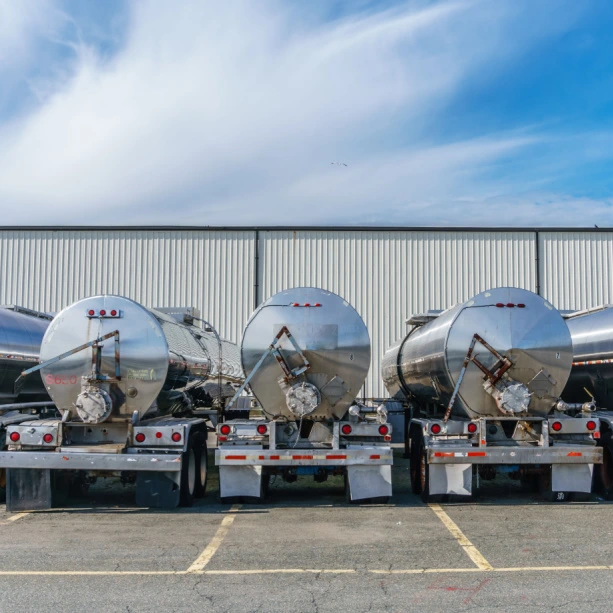Ensuring compliance with tank trailer regulations is essential for the safe and efficient transportation of various materials, ranging from dry bulk to hazardous substances. It’s important to equip yourself with the knowledge and understanding of the compliance requirements and industry standards necessary to navigate the complex landscape of tank trailer regulations. Today we’ll provide you with valuable insights and practical tips to meet compliance regulations, enhance safety measures, and, most importantly, maintain regulatory standards.
Increase Your ROI by Investing in AirFinder Everywhere
- Loss Prevention. Reduce the amount of loss that occurs during the supply chain process
- Location Coverage. AirFinder Everywhere uses a combination of GPS, Cellular, and WiFi to determine location everywhere
- Security Alerts. Know when a delay in shipment has occurred so the problem
can be addressed immediately.
Compliance Regulations
TEC Effluent Guidelines
After each use of tank trailers, they need to be thoroughly cleaned and sanitized before being used again. Without proper cleaning, residue will build up over time, leading to cross-contamination and, in extreme cases, leakage. The guidelines surrounding proper cleaning are put in place to prevent these occurrences from happening. When there is a lack of compliance in this area, not only will you be punished financially in the form of fines, but your business will suffer since you’ll also be losing money from the trailer contaminating other chemicals being transferred. If leakage occurs, you’ll have to spend money replacing the trailers as well.
Hazardous Materials Regulations (HMR)
The HMR is a regulatory framework established by the Department of Transportation to ensure the safe transportation of hazardous materials. The HMR sets guidelines and requirements for the proper handling, packaging, labeling, and documentation of hazardous materials while they are in transit. These regulations were implemented to prevent accidents, spills, leaks, and any other incident that could pose safety risks. Compliance with HMR is essential for companies involved in the transportation of hazardous materials. Adhering to HMR regulations promotes the safe and responsible transportation of hazardous materials while minimizing the potential for harm or damage.
Types of Tank Trailers
Chemical Tankers
Chemical tankers are specifically designed to transport various types of liquid chemicals, including hazardous substances. These trailers are constructed with specialized materials and coatings to withstand the corrosive nature of chemicals. Some chemical tankers may have multiple compartments to carry different chemicals simultaneously, ensuring compatibility and preventing contamination.
Food-Grade Tankers
Food-grade tankers are used for transporting edible liquids, such as milk, fruit juices, cooking oils, and liquid sweeteners. These trailers are constructed with food-grade stainless steel or aluminum to maintain hygiene and prevent cross-contamination. They adhere to strict sanitary standards to ensure the safe transportation of food products.
Bitumen Tankers
Bitumen tankers are used for transporting bitumen or asphalt, commonly used in road construction. These trailers have insulated tanks and heating systems to maintain the temperature of the bitumen during transportation. The tanks are typically made of high-grade steel or aluminum to withstand high temperatures and prevent corrosion.
Acid Tankers
Acid tankers are specifically designed to transport corrosive acids, such as sulfuric acid and hydrochloric acid. These trailers are constructed with specialized materials resistant to corrosion, such as stainless steel or rubber-lined tanks. Acid tankers have stringent safety measures in place to prevent leaks, spills, and chemical reactions during transportation.
Fuel Tankers
Fuel tankers are designed to transport various types of fuels, including gasoline, diesel, and aviation fuel. These trailers are built with safety features such as multiple compartments, baffles, and surge control systems to prevent fuel sloshing during transportation. Fuel tankers must adhere to stringent regulations to ensure the safe delivery of flammable liquids.
How to Properly Manage Compliance
Tanker trailer managers have processes in place to ensure the proper cleaning of tankers. The problem arises when managers can’t tell which tankers have been cleaned and are ready to be utilized and which are waiting to be cleaned. If there is no discernment of the cleaning status of the tankers, the trailers may be used without proper cleaning, leading to cross-contamination and other hazardous issues.
A trailer tracking system can be used to help managers solve this problem by improving yard management. Managers can designate parts of the yard to house the clean tankers and another section designated for the uncleaned trailers. This separation is important to have so managers know which trailers are available for use. The trailer tracker comes into play by alerting managers if a dirty trailer was accidentally stored in the clean lot and vice versa.
Additional Safety Measures to Take
Maintenance
Creating and sticking to a maintenance schedule helps extend the lifetime of the tankers. Regular maintenance is essential for identifying and addressing potential issues before they escalate into major problems that could compromise the safety of personnel, the environment, and the cargo being transported. By adhering to a well-defined maintenance schedule, tanker operators can minimize the risk of equipment failure, leaks, and spills, which in turn reduces accidents, environmental damage, and regulatory violations. Proper maintenance helps to keep crucial components, such as brakes and suspension systems in optimal working condition, ensuring their reliability during transportation. Additionally, maintenance activities provide an opportunity to assess and address compliance-related aspects, including proper load securement, leak prevention, and adherence to regulatory standards. By prioritizing maintenance, tanker operators demonstrate their commitment to safety and compliance, improving their image for the stakeholders involved in the transportation process.
Spill Prevention
Spill prevention and containment are of the utmost importance when it comes to tanker operations. The transportation of hazardous materials carries inherent risks; having proper prevention procedures in place and a plan for effective containment of spills is essential for protecting the environment and meeting compliance regulations. Implementing robust spill prevention measures, such as yard management and thorough pre-trip inspections, significantly reduces the likelihood of spills occurring during transit. In the event of a spill, having efficient containment systems in place, including drip pans and drain plugs, helps to limit the spread of hazardous materials and minimize their impact. Prompt and effective spill containment procedures, coupled with well-trained personnel equipped with the necessary safety gear, contribute to mitigating risks and ensuring a swift response to spills.
Additional Uses of Trailer Tracking
Using trailer tracking to manage your tankers helps you beyond ensuring compliance. From monitoring trailer utilization to sensing shock during transit and more in between, it gives you visibility of all the details you need to be successful.
Utilization
Are all of your trailers being used to their fullest extent? Most operators will say yes, but they don’t have the data to prove it. The process of using trailer tracking for yard management and compliance also provides insight into how often your trailers are being used. It’s just a matter of choosing to use that data. You can find out if certain trailers have been sitting in the back of the lot, collecting dust; you can find out if certain trailers are almost never in the lot. Most companies have discovered that when they have trailers being underutilized, they also have trailers being overutilized. When trailers are underutilized, there is a higher cost per load. The overutilized trailers will have a shorter lifetime than they should. Utilizing each trailer adequately means the cost per load decreases and trailers won’t break down too soon.
Data Analytics
Data analytics help companies in two main ways. One is to have proof of compliance. The reporting features included in a trailer tracking solution makes collecting data and exporting reports simple. When there is a question about compliance, the records are easily accessible. As for the second, good decisions are difficult to make without data to back them up. Recording all data gives managers the information they need to make strategic decisions. If managers want to know about trailer utilization, as mentioned earlier, they have the data to evaluate usage so they can make any adjustment needed.
Dwell Time
Tracking tankers helps companies assess operational efficiency and identify bottlenecks in the supply chain. By monitoring how long a tanker trailer spends at various locations, fleet managers can identify delays or excessive waiting times. Understanding trailer dwell times enables managers to optimize scheduling, improve resource allocation, and minimize idle time, which all help to enhance overall productivity. Additionally, tracking dwell time tells managers if a trailer has been left at a location too long. This can cause increased costs, as at some locations, companies have to pay for idle time. To avoid these costs, you can simply monitor how long your trailers sit at lots off-site and act to reduce that time.
Sensors
Excessive shock and vibrations have the potential to compromise the cargo being transported, especially in the case of sensitive or hazardous materials. By monitoring shock levels, fleet managers can ensure that their cargo remains secure and undamaged throughout the journey. Monitoring shock also helps managers identify potential issues with the trailer's suspension, tires, or other components that may require maintenance or repair. Proactively addressing these issues enhances safety and minimizes the likelihood of accidents or spills.
What Do You Have in Place for Compliance?
It can be a struggle to meet compliance requirements without the right systems and processes in place. But you don’t have to struggle when you have a trailer tracking solution to help you. Using a GPS tracker for trailer tracking and yard management makes meeting compliance regulations easy and stress-free by helping to ensure that tankers are adequately utilized and only clean trailers are used for transportation.
Our AirFinder Everywhere solution provides fleet managers with visibility of their tanker trailers at all times. With AirFinder, you can easily meet compliance regulations and gain all the additional benefits trailer tracking devices provide, including analytics for decision-making and embedded sensors to monitor shock. Learn more about tanker trackers and how you can ensure you are compliant with AirFinder by booking a demo.![]()




